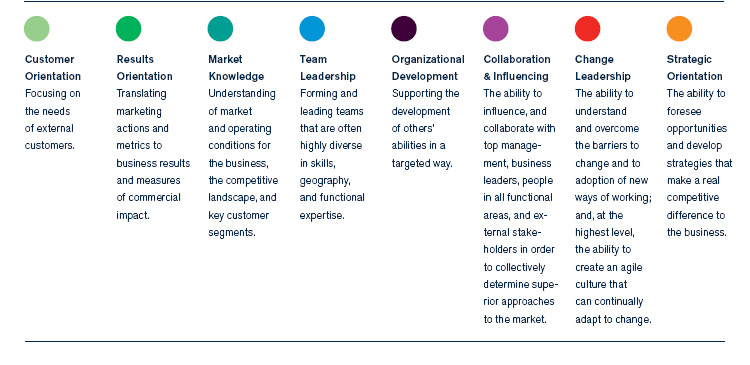This is the first installment in a series of Executive Briefs for Chief Marketing Officers based on recent research conducted by Egon Zehnder involving several hundred senior marketing executives at more than 300 companies worldwide.
The seismic changes now transforming marketing have made the role of CMO more demanding than ever. New media, new channels, and new expectations from Boards and CEOs have converged to require CMOs to constantly improve their performance and broaden their scope. They can start with the set of essential leadership competencies that C-level executives must master and maintain. With an understanding of these competencies, CMOs can make sure their skills are fully developed. And they can use those competencies as a guide in fulfilling one of the most important — and most neglected — responsibilities of senior leaders: developing the talent of the people on their teams.
Understanding the Requisite Competencies
Based on our experience working with senior management teams across industries and on more than 25,000 management appraisals conducted during the past five years, Egon Zehnder has developed a comprehensive model of leadership that encompasses the core competencies of top leaders, no matter their function or role. Those universal leadership competencies include: customer orientation, results orientation, market knowledge, team leadership, organizational development, collaboration and influencing, change management, and strategic orientation. Together, these eight competencies make up the portfolio of abilities that top leaders, including marketing leaders, must have. (See Fig. 1: Essential Leadership Competencies: A Marketing Context)

Understanding the Sequence of Competencies
Although a CMO needs all of these leadership competencies, different combinations of these skills come to the fore as the executive rises through the mid-levels and senior ranks of marketing. And the sequence in which the compe tencies are developed differs from the sequence in other functions. For example, customer orientation and results orientation are fundamental competencies that marketing executives must possess from the start and develop intensively throughout their careers. Customer orientation goes hand in hand with market knowledge and should also be developed early. By contrast, executives in IT aspiring to be Chief Information Officers (CIOs) do not need intensive customer orientation and market knowledge until they rise to the top job. The marketing function, however, looks outward even at its lower levels.
Paying Special Attention to Traditional Weaknesses
Success as a CMO requires the development of two competencies in particular: team leadership and organizational development. Marketers generally do not achieve high scores on either. But as they advance in their careers they must be able to build and lead effective and successful teams. That often includes teams that span different functions and divisions. Further, given the growing importance of digital media, marketing executives must be able to manage both creative and analytical people.
Outstanding team leaders, who help develop the organization and its people, generate enthusiasm through personal integrity and trust. They remove obstacles and make the necessary resources available to facilitate the team’s success. They take personal risks — and if things go wrong, they shield their team and take personal responsibility.
Building the Right Bridges and Leading Change
Marketing belongs at the heart of the value chain. It is active on behalf of all business divisions and national and global operations, acquiring new customers and building customer loyalty for everyone. Because it is such a pivotal function, its top leaders must be adept at collaboration and influencing. That means approaching others without prejudice, even when their professional background and interests are different. (And it also means toning down the marketing jargon and translating it into terms that non-marketing experts can understand.) Senior marketing leaders must be able to put themselves in the position of other functions, understanding their aims and finding ways of helping others achieve their goals.
It is especially important to build bridges to the parts of the organization that are at the core of the business. However, Board members — and especially the CEO — always constitute the primary interface because they have the power to promote or bury projects. Different divisions, countries and regions will vary in importance from one company to the next, as will external service providers. Bridge-building activities should also target those two groups.
Working collaboratively and influencing many parts of the organization, the senior marketing executive seeks to embed marketing and the customer perspective as central guiding elements of the organization. This perspective can often involve wrenching change for siloed organizations operating under outmoded models of marketing that see it as an adjunct of sales. The senior marketing executive must therefore have the ability to lead change — not just to influence the organization but show it the way to new ground.
Becoming a Strategic Business Partner
The final piece of the puzzle is the strategic orientation that marks the outstanding CMO. That doesn’t mean simply applying narrowly conceived marketing strategies, but developing an outlook that incorporates all of the value generating aspects of the enterprise and exploits their commercial potential. It requires the rare ability to ask and answer a deceptively simple question — how does the business make money — and to make marketing an integral part of the process. CMOs who can do that can fulfill the role of strategic business partner that CEOs increas ingly say they want. That’s the ultimate formula for success as a CMO — and the starting point for eventually becoming a CEO.





